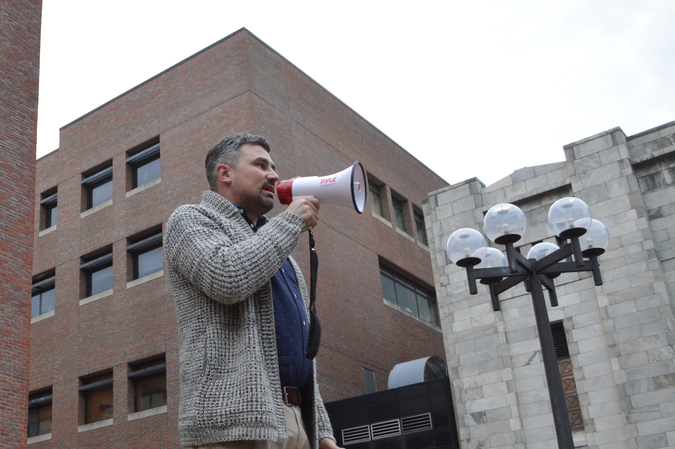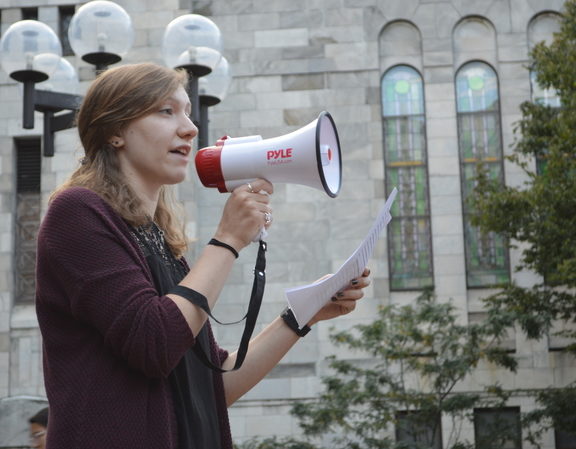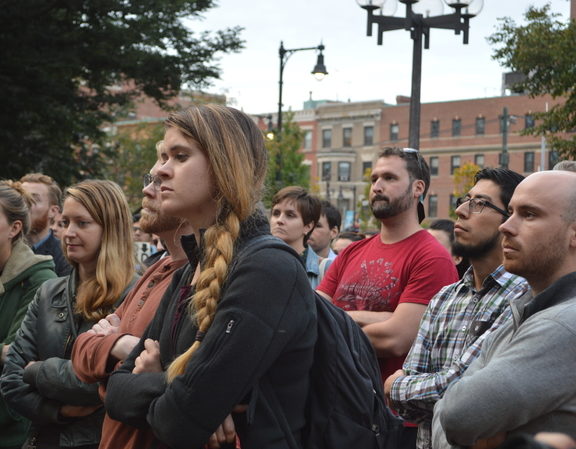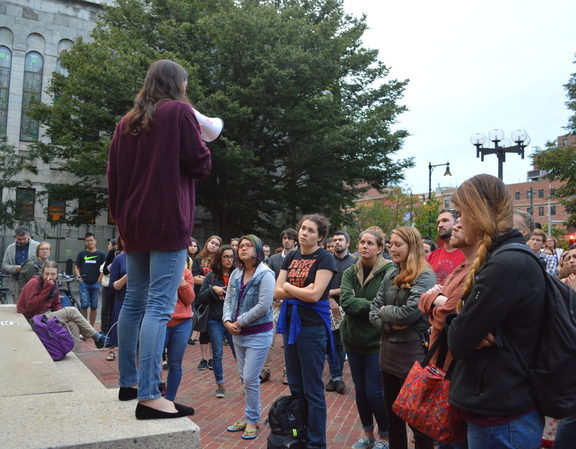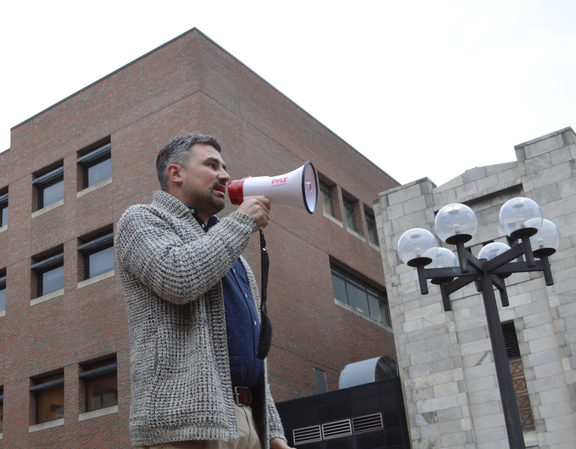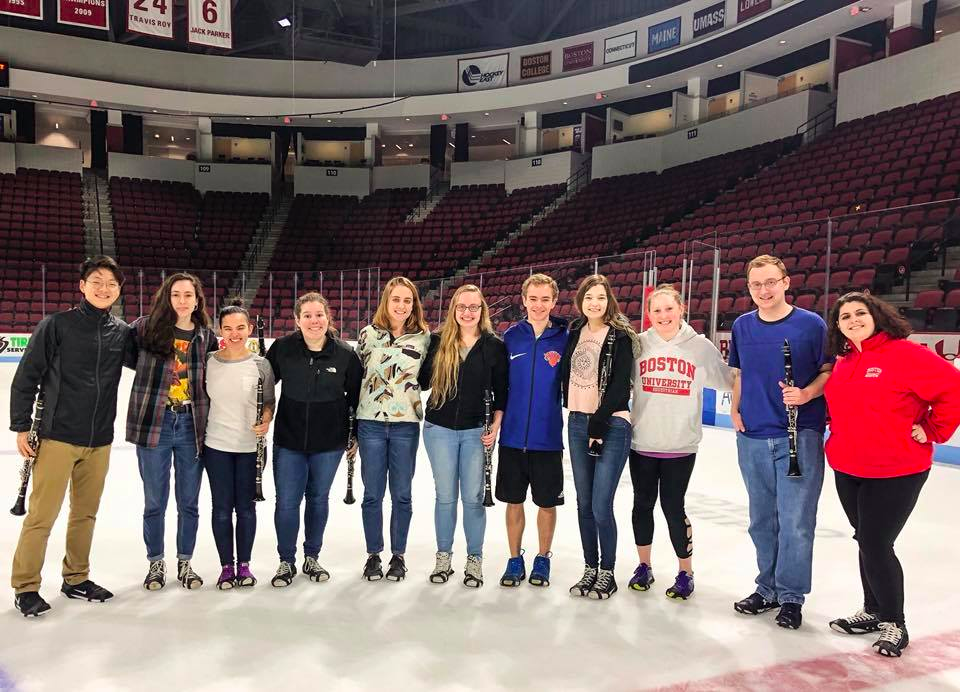Additional reporting by Yadira Flores, Arianna Adirim-Lanza, and Noemi Arellano-Summer. All photos by Carolyn Komatsoulis.
- Lizzy Karnaukh adresses the crowd
- Students listen to speakers.
- The rally took place outside the Metcalf Science Center.
- Nathan Brewer, a SARP employee, speaks at the rally.
Boston University’s Graduate Workers Union organized a rally on Oct. 11th to speak out against sexual assault and call for a better system for students to air such grievances. The rally occurred less than a week after allegations of sexual harassment against a BU professor were revealed in Science Magazine.
The allegations from two of professor David Marchant’s former graduate students came a few weeks after Secretary of Education Betsy DeVos’ decision to eliminate two sets of Obama administration guidelines regarding campus sexual assault investigations which she reportedly undertook to fairly represent the rights of the accused.
Colin Riley, BU’s executive director of media relations, declined to comment about the Graduate Workers Union. When asked about the allegations, he said “the university is investigating.”
“This rally is really not about any one case, or policy, or institution,” said Jessica Lambert, a Boston University third year PhD student in the anthropology department and one of the rally organizers.
The event, which was held in front of the Metcalf Science Center, focused on the pervasion of sexual assault, particularly in STEM fields, and organizing to affect change at BU even as students acknowledged that the issue was not unique to BU.
“This is a systematic problem and it has not gone away,” said Lizzy Karnaukh, a BU graduate student.
Many of the students who attended believed it was important to do so to provide solidarity for victims of sexual assault. Kelly Keenan, a graduate student studying French at BU, who said she had a personal tie to the issue said she came out “to just support anyone who is affected by this issue.”
However, the number of people in the United States affected by the issue varies by the definition of the issue.
According to a National Intimate Partner and Sexual Violence Survey (NISVS) report fact sheet from the Center for Disease Control and Prevention (CDC) that was published in 2017, the number of Americans affected by “victims of contact sexual violence” is nearly 23 million women and 1.7 million men. According to an infographic about the report, contact sexual violence is rape, being made to penetrate, sexual coercion, and/or unwanted sexual contact.
According to the Bureau of Justice Statistics document “Rape and Sexual Assault Victimization Among College-Age Females, 1995–2013,” the NISVS takes a public health approach to the survey and has a broader definition of sexual assault then the Bureau of Justice Statistics National Crime Victimization Survey (NCVS), which only accounts for “unwanted sexual contact that rises to a criminal level.”
Another concern for the Graduate Workers Union was that students who are assaulted are afraid of repercussions that may arise from going to the authorities. Karnaukh said those fears include “fear of retaliation, fear of others finding out, fear of being blamed or socially ostracized.”
According to the NCVS, rape and sexual assault victimizations of students (80%) were more likely than nonstudent victimizations (67%) to go unreported to police.
Members of the Graduate Workers Union at the rally expressed their desire to organize and improve how students can report sexual crimes.
“With the power of the union behind us, graduate students will have a grievance process that is independent, transparent, fair and neutral, and free from problems caused by university’s conflicts of interest,” said Betsy Cowdery, a fourth-year PhD student in the earth and environment department and a member of the Graduate Workers Union.
Furthermore, graduate students discussed power dynamics as an factor and issue in sexual assault cases within academia.
“Reporting among graduate workers is even less frequent as too often the very perpetrators whom they would be reporting are the advisors or principal investigators responsible for their future,” Karnaukh said.
Speakers at the rally also included Maureen Mahoney, the director of BU’s Sexual Assault Response and Prevention Center (SARP) and Nathan Brewer, an employee at SARP, who emphasized their services and training opportunities.
According to the NCVS document, fewer than 1 in 5 female student (16%) and nonstudent (18%) victims of rape and sexual assault received assistance from a victim services agency.
Furthermore, a few students spoke to the emotional impact of assaults in academia, such as Cowdery, who said it always creates a sense of unease and a culture of fear.
“I can personally speak to the trepidation and anxiety I experience daily,” Karnaukh said.
Cowdery also believes that this experience is one that is common.
“We must understand that this is a big part of what many women in academia deal with every day,” she said.
Other students who attended the rally agreed that the problem is not visible.
“I think it’s important that this issue be addressed and I think it’s something that’s not talked about enough,” said Melissa Burrows (CAS ’18).
“I see a problem that never ends,” Lambert said. “Unless, that is, we end it.”

